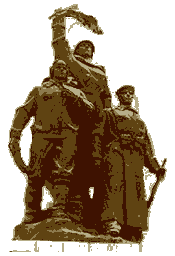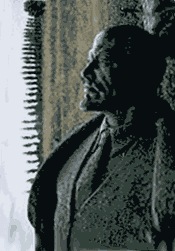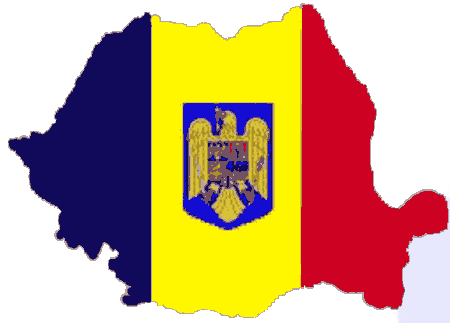|
from 03 march 2002 blue vol II, #23 edition |
|
|||
|
Letter to an Uncle by Georgia Cretulescu
I remained quiet for a few seconds and thought about
the answer. It wasn't an easy task to comprise in a
few phrases such a confused and complex reality. I was
in a dilemma: to show him the objective picture, or
try to make it more agreeable? And so I found myself
facing an unpleasant trough: I personally don't really
like what I am seeing around.
After, a bloody revolution and twelve years of
democracy, after several governments and so many
social costs, we are still in transition. When the
communist block collapsed Romanians too wanted no more
dictatorship, no more hunger, political police terror,
no more Ceausescu. So a new political system came to
bring the country into the 'New World,' where the
democracy and the capitalism promised to make
everybody free, rich and happy.
As we see now, it wasn't an easy road to go. An
economy based on socialist principles, where we
produced almost everything (so quality wasn't really a
priority), had to transform in ways that European
Union began to "suggest". In a short period inflation
affected the national currency and now the balance is
one dollar for 30,000 lei (in 1989 was one dollar for
18 lei). Politicians had to be formed in the spirit of
the new values.
It is worrying for me to see young intelligent people
studying hard to get the degree that would get them
closer to a job somewhere, anywhere, abroad. There is
a hope, that I don't believe in, that when our country
is part of the European Union and NATO things will be
much better. But until we begin to stand on our own
feet and not take any more loans to survive, not a
single international organisation is going to be our
saviour. I believe in building a strong civic
education that would help people to understand the
need for individualist development, the values of the
democracy, its benefits as well as it's demands. In
building a stable civic society as well that would be
able to limit and control the power of the state in
its present form.
It may still be a long term ambition, but I believe in
the future and most of all in a better one; that's why
I study political and social science. So I finally
smiled and said yes, you have a place to come back to
and it is a wonderful place, not the country of
Ceausescu and Count Dracula, not the country of dark
history – but the one of a promising future with great
people and culture, the country of Nae Ionescu, Mircea
Eliade or Emil Cioran, the place that I'm sure you
missed.
-
by Georgia Cretulescu.
|
|||

 LAST week my uncle Mihai, who lives in the USA, called
and asked how is my family and how is the situation in
the country in general. He emigrated there twenty
years ago in the communist period and now he's
thinking to come back to Romania.
LAST week my uncle Mihai, who lives in the USA, called
and asked how is my family and how is the situation in
the country in general. He emigrated there twenty
years ago in the communist period and now he's
thinking to come back to Romania.
 In the meantime the old system's
members formed the new political class that had the
same old mentality. The people were indoctrinated and
not educated to understand the changes that had to be
done or the purposes for change. The economic,
political and social system was (and still is) in
transition, a long hard one. A foreigner would hardly
believe that the average wage in Romania is one
hundred dollars a month, or that people are waiting
for the government to solve all their problems like
the paternalist system they were used to.
In the meantime the old system's
members formed the new political class that had the
same old mentality. The people were indoctrinated and
not educated to understand the changes that had to be
done or the purposes for change. The economic,
political and social system was (and still is) in
transition, a long hard one. A foreigner would hardly
believe that the average wage in Romania is one
hundred dollars a month, or that people are waiting
for the government to solve all their problems like
the paternalist system they were used to.
 Image 1: Romanian flag
Image 1: Romanian flag